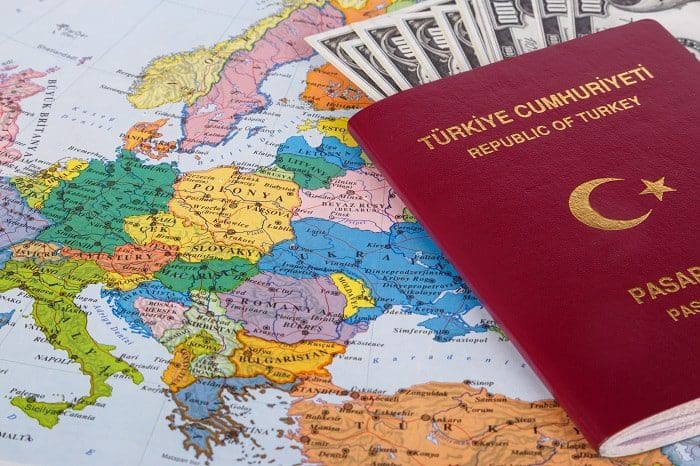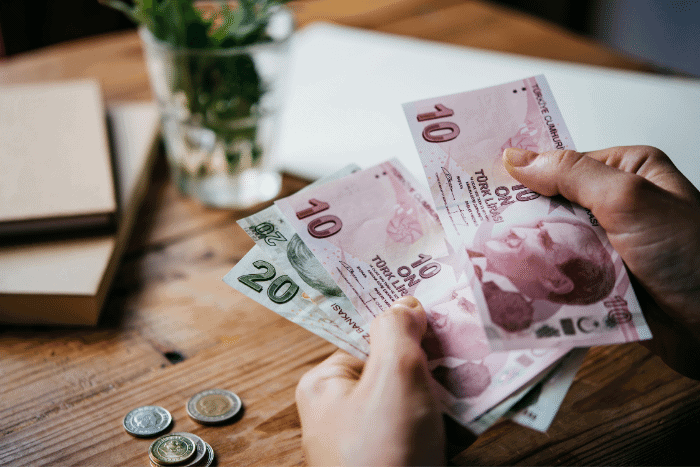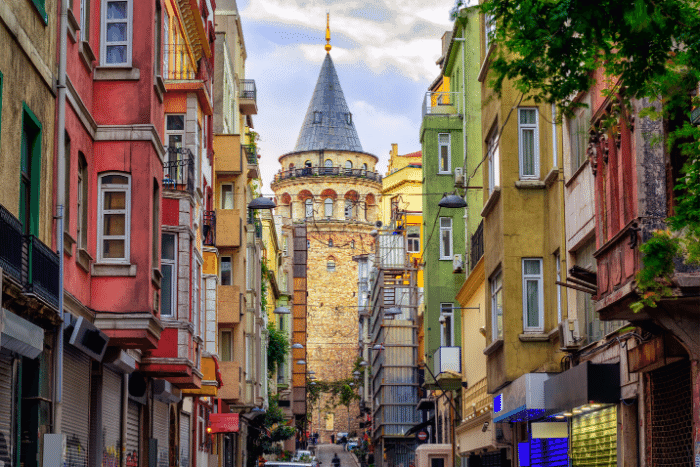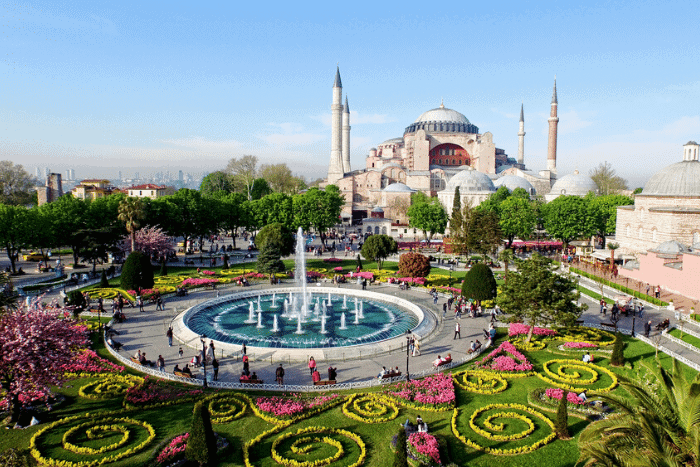The Turkey Real Estate Guide: How to Purchase a Property in Turkey
February 25, 2025
Turkey has a couple of great things going for it right now.
Well, it has a lot more than just that, but these are two very important considerations for any entrepreneur thinking about overseas investment.
Not only is Turkey one of the hottest prospects in the ‘second citizenship market’ right now, but it’s also a highly attractive place for real estate investment.
Istanbul, for example, is full of great deals and opportunities.
From penthouses in some of the most coveted neighbourhoods to new land developments in the suburbs, Istanbul offers a great ROI for those willing to do the legwork.
So, how do you invest in real estate in Turkey, how do you maintain your property and what taxes are applicable when you decide to sell it?
To help answer those questions, the Nomad Capitalist team has put together an in-depth analysis of Turkish real estate.
Why Invest in Turkey Property?
Economic growth and personal prosperity are at the heart of Turkey.
The fact that it has forever been ‘stuck between the West and the East’ means the country has been able to observe, adopt and adapt the best practices of both worlds.
Its ‘Asian’ ability to grow its GDP, coupled with the yearning for a ‘Western’ quality of life, makes Turkey an attractive proposition.
It’s not just these qualities or its favourable geographic location, however, that make Turkey a great place to invest.
Founded amongst the remnants of the Ottoman Empire back in 1932, the Turkish Republic shunned religious rules, replacing them with secular laws, which is a major part of why it has become an important player on the global stage.
The country has a young and dynamic population where the median age is 33 – talk about potential.
This guide focuses specifically on Istanbul. It’s not only the largest Turkish city but also the most important one geopolitically, and, of course, it’s also a great place to invest in real estate.

Get a Turkish Passport With Your Real Estate in Turkey
Buying real estate in Turkey has a huge perk – you can get a passport if you invest a large enough sum.
When it launched its citizenship by investment program, Turkey set the price at US$1 million and had almost no takers.
The price of the program went down to US$250,000 in 2018, but its sheer popularity led to public pressure in Turkey, resulting in the minimum investment requirement being raised in 2022 from US$250,000 to US$400,000.
Citizenship by investment in Turkey is one of the hottest prospects in the Nomad Capitalist world right now, and people are buying Turkish passports up.
It’s a very attractive option for those who want to invest and get a second passport. A Turkish passport can be a great addition to your passport portfolio because it’s an E-2 visa treaty country with the United States.
So, if you need a quick solution for accessing the US, a Turkish passport might be just the thing. And Chinese investors have certainly jumped on this bandwagon.
Recently, Turkey disclosed that it’s likely to raise the price of the program in future. But they’d only be doing that if they felt there was still enough demand.
It’s a big enough market to absorb more demand, so we only see it growing in the future.
The Best Neighbourhoods for Istanbul Real Estate Investment
With a population of around 16 million, Istanbul is an incredibly diverse city. There are many neighbourhoods – some more desirable than others.
Here’s where you should be looking to buy:
Nisantasi. One of the most expensive areas, Nisantasi, is where the fancy restaurants and the shops are. Finding cheap deals here is impossible, but if you purchase real estate in Nisantasi, its value is likely to rise in the future. You could find good US$500,000 options suitable for the citizenship by investment program, but it would be a relatively small place. Real estate in this area is generally a lot more expensive.
Taksim. A central area within the historical centre, Taksim has the oldest mosques and palaces in Istanbul. It’s possible to find something under US$1,000 per square meter in Taksim, although most real estate here costs around US$1,500 per square metre. And you should be careful buying here; the quality of the buildings will differ from street to street. Most ground floors, mezzanine, first and second floors are the cheaper options.
Karakoy. It’s an area of mostly older buildings in what we call the hipster side of Istanbul. There are loads of cafes and restaurants on the streets and plenty of people out and about. You can really feel the big city vibes here. Deals for around US$1,500 per square meter can be found in Karakoy by those who look hard enough. However, this is only possible on the outskirts of this neighbourhood. Most properties are more expensive.
Cihangir. Just minutes away from Karakoy is another trendy part of town. Cihangir has long been a favourite with the musicians and the artists of the city. Now, many startups have made Cihangir their home, too. Well-educated Turkish families and expats intermingle here, which makes it a perfect place to buy an apartment for an investment.
Why Purchase Property in Turkey Now?
Many people will not be comfortable with the idea of investing in Turkey, but there are plenty of great deals and opportunities here. This contrarian viewpoint is the answer to the question, ‘Why now?’
Multiple factors contribute to the situation in Turkey today, where real estate deals are easy to come by.
However, one of the biggest reasons is the downfall of the Turkish lira (TL), which took place in 2018 and has continued.
Right now, one US dollar can buy approximately 36 Turkish lira compared to less than four lira at the start of 2018, so you could say that Turkey’s real estate is on sale.
And that’s a great opportunity for investors.
How to Purchase a Property in Turkey
If you’re a seasoned investor, navigating a new locale will come naturally. You’ll go in and find yourself a few reliable locals to help get the job done.
But if you’re just starting to invest in real estate or diversify your investment portfolio (geographically or in terms of asset classes), then you might need a little bit more hand-holding.
In both cases, this section of our Turkey real estate guide will tell you how exactly to invest in practical terms.
Finding a Great Deal on Turkey Homes
Buying property in Turkey involves multiple steps. First, you’ll need to find a real estate agent, then find and view a property that you’d like to buy.
You’ll also need to be aware of all the fees and legal processes involved before you legally become the owner of a Turkish apartment and can start benefitting from a 6-7% annual average ROI.
Real Estate Agents and Commission Fees
First things first, you’ll need to find a real estate agent unless you’re set on scouring the Turkish property ads yourself.
You need to find someone reliable, and it’d be great if a person was recommended to you. As always, Nomad Capitalist can help here.
The legal maximum limit for the real estate agent commission is 4% of the property value, which is fairly average compared to other countries.
The law states that the rate should be divided equally between the buyer and the seller, but of course, there are nuances.
In some cases, the seller may stipulate that the burden of paying the agent commission fees is totally on the buyer. This is especially done when the seller is in no rush to sell and can patiently wait for a buyer who will agree with these terms.
The Title Deed
When it comes to the title deed – the legal document that passes the property ownership from someone else to you – the fee is also 4%.
In the same way, the rate should be divided equally between the buyer and the seller. The law dictates that.
Yet, in some cases, the seller leaves the payment burden on the buyer in full.
The title deed fee on real estate in Turkey is paid after scheduling an appointment at the land registry before the title deed transfer commences.
So, if the seller requires you to pay the real estate agent commission and the title deed fees in full (which they legally can), you’re looking at an 8% up-front payment before the transaction even begins.
That’s definitely something to keep in mind. For a US$200,000 property, you’re looking at US$16,000 in fees, for example.
What’s What: Turkey Real Estate VAT

VAT is the most complex fee in Turkish real estate. With so many rates, rules and exceptions, it’s easy to get lost, so let’s break it down.
You do not have to pay VAT when:
- You are the first owner of a house or an apartment in a new project or
- You are buying from an individual whose livelihood isn’t selling properties.
Note that buying land is an entirely different ballgame and it should be done with even more caution. Different rules on VAT and other fees apply.
And you definitely have to pay VAT when you’re a foreign buyer and purchasing from a Turkish company that sells pre-owned properties as their main field of business.
So, there are a few good ways to avoid having to pay VAT if you’re smart with your property search.
If you want to go the traditional route and buy a pre-owned apartment in the older part of Istanbul, for example, look for sellers who are regular people (not companies or agencies) to avoid VAT.
How VAT is Calculated When You Invest in Turkey Property
Have you determined that you’re liable to pay VAT? It’s not necessarily bad news.
It’s based on multiple factors and is calculated in rather complex ways. The two main things you must take into consideration are the date of the building license and the surface area of the property.
If the building license has been obtained before 1st January 2013 and the surface area is 150m² or below, then the VAT rate charged is 1%.
However, if the surface area exceeds 150m², then the VAT jumps to 20%. You better avoid anything this large.
But what about building with a license that was obtained between 1st January 2013 and 31 December 2016?
If the per-square-metre value is between TL 500 and TL 1,000, the VAT charged is 8%. Going for a higher-value property? Anything over TL 1,000 gets a 20% VAT charge.
For the newest properties, if a building license was obtained on or after 1st January 2017 and if the per-square-meter value is between TL 1,000 and TL 2,000, the VAT rate is 8%.
If the value is above TL 2,000, you will get charged 20%.
You get the pattern. Lower-priced and older properties carry lower VAT charges than newer and more expensive properties.
It’s obvious that the laws have changed quite a bit in the last decade, hence the different rates.
So, as always, you should keep in mind that the above-mentioned rates can change at any time. The Turkish government isn’t exactly known for extreme stability.
We’d suggest you contact a certified public accountant to calculate the most recent VAT rates for specific properties.
A Note on Surface Area of Properties in Turkey
One of the things that the VAT rate depends on is the surface area of the apartment that you’re looking to buy.
However, the number that you can find in ads doesn’t usually match the actual living space of the apartment. Sometimes, by quite a lot.
For example, say you find a place advertised that is 80m². You’re interested, so you go to view the apartment. Strangely enough, it feels much smaller than 80m².
That’s because it is. The 80m² includes part of the communal garden and part of the stairwell, too, which are technically ‘yours’ but aren’t liveable spaces.
This is one of the peculiarities of Turkish real estate, so make sure you never buy a place without visiting it first.
Other Property Purchase Costs in Turkey
There are four more fees in addition to the fees mentioned above that don’t amount to much but that you should still keep in mind.
Revolving Capital Service Fee: This fee depends on the area of the city/country where you’re buying property. For example, in most of Istanbul, you’d pay around US$60. We won’t bore you with the math.
Land Registry Service Fee for Foreigners: This is a fee of approximately US$110 that changes annually.
Appraisal Report Fee: It’s mandatory to issue an appraisal report for the property that you wish to buy. These reports can only be issued by companies registered on the Turkish Capital Market Board’s list. The fee ranges from US$150 to US$325, approximately.
Expert Translator Fee (Optional): Expert translators are different from sworn translators at a notary. Only a few expert translators exist in the market, which makes them expensive. However, they are only needed if the foreign buyer wishes to attend the Land Registry himself and not via an attorney who has Power of Attorney.
Maintaining Real Estate in Turkey: Logistics and Taxes

As with every investment property, you should have a solid plan for maintaining it.
Usually, hiring a local property manager can save you a lot of headaches and is certainly worth your while.
But having a property manager doesn’t mean you shouldn’t do your homework. You also need to know just how much money it will take to run your investment property on an annual basis so that you know what to expect in terms of the property’s ROI.
Insurance, Fees and Bills
Here are a few extra costs to expect associated with your property:
Mandatory Earthquake Insurance: Turkey sits in a zone of relatively high seismic activity, so every property owner must pay a mandatory earthquake insurance premium. This annual payment is approximately US$30.
Not having earthquake insurance will mean your property purchase will be delayed by the land registry.
Environment Tax: This tax depends on the usage of water in the property. It’s charged with every water bill, so your tenants should cover it.
Maintenance Fees: This is a fee that depends on the type and location of the property. Normally, the tenants will pay the maintenance fees in Turkey, so if you’ve purchased a property for investment, it’d be wise to also find a tenant.
Bills: All of the bills, including electricity, water, gas and waste management, are traditionally paid by the tenants, as everywhere else in the world. If the property is vacant and no one is using the utilities, a small part of the bills will still have to be paid for service maintenance.
Property Tax
Property tax is just one of the ‘taxes on wealth’ applied in Turkey. It must be paid every year in two equal installments.
The annual tax rate is 0.2% for apartments and houses within the borders of a metropolitan municipality, such as Istanbul.
So, the owner of an apartment in central Istanbul worth TL1,500,000 will pay TL3,000 per year in total.
The first installment must be paid for in May and the second in November. The rate is 0.1% in smaller towns, so homeowners living in the suburbs would pay half the property taxes of those living in big cities.
If you’re selling a property, you’re obligated to pay the accumulated property tax burden from all of the previous years before a title deed transfer can commence.
In other words, no buyer will want a property with outstanding property tax debt.
The Challenges of Buying Property in Turkey

Everything comes with its challenges.
The main obstacle to buying real estate in Turkey is that there are so many developers who are skilled at sales and so many websites that do a great job of marketing.
Meanwhile, the inventory is not so great. In fact, it’s often just bad.
The sweet-talking developers and the great-looking websites sell to foreigners from the UK, the US, Germany and plenty of others. They get you in on a ‘great deal’, which isn’t a great deal at all.
You need to get on the ground and check out the actual inventory of properties. Only then can you be sure you’re getting amazing prices.
And if you do, do so quickly. As Turkey comes onto more people’s radar, the prices will continue to rise.
In other words, there won’t be many deals going for under US$1,000 per square meter for long.
Selling Your Real Estate Investment in Turkey
Based on Nomad Capitalist’s research, now is a great time to invest in real estate in Turkey.
However, there will come a time when you’ll want to sell your property, and the market isn’t as liquid as elsewhere.
So, it’s recommended to plan your moves not months but years in advance.
And, naturally, there are various fees to consider when you sell your property in Turkey.
Remember the real estate agent commission we talked about before? It’s 4%, split between the buyer and the seller.
Plus, if you sell your property within 5 years of purchasing it, you are liable to pay the Unearned Increment Tax.
How Unearned Increment Tax Is Calculated
Unearned increment tax is just like capital gains tax, and it’s payable if the increase in the property’s worth exceeds the Turkish Domestic Producer Price Index (DPPI).
Let’s do a sample calculation.
Let’s say the property was purchased on 1st January 2015 for TL200,000, and four years later, on 1st January 2019, you wanted to sell it for TL400,000.
You’d look at the DPPI of 1st December 2014, which was TL235,84 (you must look at the index of the previous month), and the DPPI of 1st December 2018, which was TL422,94.
A bit of math follows:
TL200,000 x (422,94 / 235,84) = TL358.666 – this is your threshold in terms of natural increment.
Then, you’d subtract that sum from your asking price of TL400,000 to get TL41,334. This is the basis of the assessment of the unearned increment tax.
Every year, they come up with an exceptional discount in Turkey. In 2019, this discount was TL12,000.
So, TL41,334 – TL12,000 = TL29,334.
You can also subtract the title deed fee from the final taxable sum. It was 1.5% in 2019, calculated from the total asking price (so 1.5% of TL400,000).
TL29,334 – TL6,000 = TL23,334. This is the final sum that is subject to taxation at the same tax bands as income tax.
In 2025, these rates are:
- TL0 – TL158,000 = 15%
- TL158,001 – TL330,000 = 20%
- TL330,001 – TL1,200,000 = 27%
- TL1,200,001 – TL4,300,000 = 35%
- TL4,300,001+ = 40%
So, in our scenario above, you’d be paying TL3,500.10 (US$96.85) tax to sell your house at the current rates. It’s a tiny amount, really.
Either way, if you keep your house for five years, you don’t have to worry about paying this tax at all when the time comes to sell.
Buying Real Estate in Turkey: FAQs
Turkey is generally a safe country to live in. Property scams can happen, but they are rare. Earthquakes are perhaps the biggest danger and earthquake insurance is mandatory for all property owners in Turkey.
Yes, although there are some restrictions. Foreigners can’t buy more than 30 hectares of real estate or property that covers more than 10% of a district. They also can’t buy land in a military zone.
Istanbul is Turkey’s largest city and is home to a large population of foreigners. The large expat population is a large contributor to the thriving business environment in the city.
Yes, if you buy a property, you’re eligible for short-term or, under certain circumstances, long-term residency permits in Turkey. If you buy a property worth at least US$400,000, you’ll be eligible for Turkish citizenship.
The process of a property sale typically takes one to two weeks in Turkey.
The Turkish Lira has taken a beating in recent years, and this has made Turkish property more affordable for foreign investors. Provided that Turkey continues to make an economic recovery, you’re likely to make great profits on any property investment you make here.
Turkish Real Estate Investment: Why Not?

The Nomad Capitalist team is always on the lookout for new markets, and when we look, we’re searching for the next proverbial Singapore.
We want great deals and an easy way to get business done. Right now, Istanbul is one of the European hotspots providing that.
Despite some of the challenges, Turkey has a huge domestic market, a good reproduction rate and a young population.
The pummelling that the Turkish Lira has suffered in recent years makes it the perfect place for savvy investors to swoop in and purchase real estate. And they can even get their hands on a Turkish passport when they do so.
Not everyone will be sold on Turkey, but if you can find a great deal and perhaps get a second citizenship in the process, why not go for it?
Real estate prices are likely to continue rising while capital and people will continue to arrive in Istanbul.
Are you ready to make the move? Nomad Capitalist is the specialist in helping wealthy investors and entrepreneurs to ‘go where they’re treated best’. Our clients are paired with experts in tax, investment strategy, asset protection and immigration to create a holistic strategy based on their unique goals. And we help execute these plans to ensure no unexpected hitches get in the way. Click to learn more about how we can help you.



Does Puerto Rico Pay Taxes to the US?
It’s a common question and one that often fuels confusion, debate, and a fair share of misinformation – Do residents of Puerto Rico actually pay US federal taxes? When most people think of US tax obligations, they naturally assume they apply uniformly across all US citizens. But when it comes to Puerto Rico, things are […]
Read more

Zug Canton Taxes: The Ultimate Destination for Wealth Management in Switzerland
Switzerland’s global reputation is built not just on stunning views of Alpine peaks and serene lakes but also on a foundation of exceptional quality of life, world-class infrastructure and investor-friendly tax policies. The results speak for themselves: efficient public transport seamlessly links cities and villages; the standard of living regularly ranks among the highest in […]
Read more

How Smart Investors Use Venture Capital to Build Wealth
Big companies like Google, Amazon, Facebook and Apple all started out as bold ideas backed by venture capital. Decades later, the same firms are household names, as familiar to most people as electricity, the internet, or the telephone. But hindsight is a fickle friend. The truth is, it wasn’t always so obvious they’d succeed. These […]
Read more





